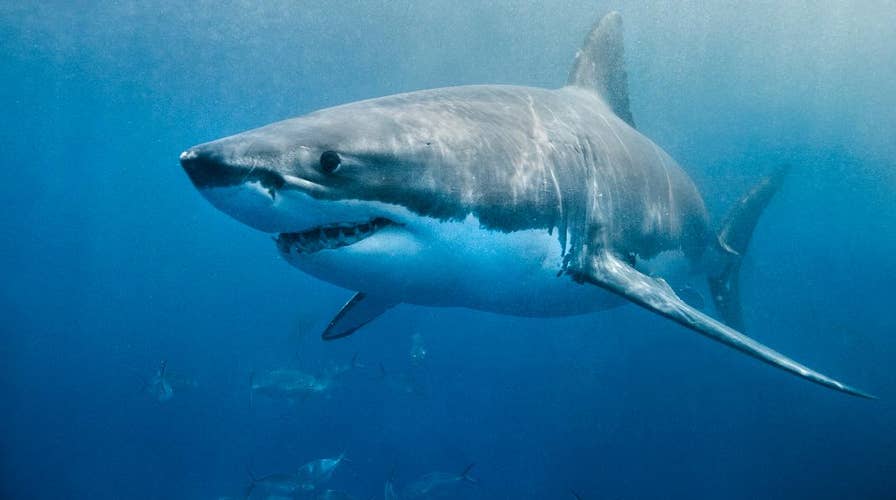Shark video: Great white snags a fish from Cape Cod fisherman
New video shows a great white shark trying to steal a striped bass from a fisherman in Cape Cod Massachusetts.
The Atlantic White Shark Conservancy is under fire for posting photos of an 10-foot great white shark hanging by its tail on a dock in Massachusetts.
According to the agency, the great white was "unintentionally" caught in a gillnet and died shortly after. Since the catch was an accident, the AWSC determined it was not illegal.
The group, along with the Massachusetts Division of Marine Fisheries and NOAA Fisheries New England/Mid-Atlantic, arrived at the scene in Scituate, Ma. over the weekend to collect samples.
500-POUND GOLIATH GROUPER EATS SHARK AS SHOCKED FLORIDA FISHERMEN WATCH: 'HE JUST SUCKED IT IN'
The AWSC shared several photos of the dead shark, which was bleeding and hanging upside-down in front of a crowd of people. In some photos, people appeared to pet the shark — some holding onto its fins.
Hundreds of people commented on the Facebook post, calling the images "barbaric" and "offensive."
"AWSC, I'm a huge supporter. But I find this post very offensive . What happened to this animal is in my opinion criminal. Then to hang it like a trophy is disgusting. There are other ways for our children to learn about sharks. Wish you discouraged this ... I'm very disappointed," one Facebook user commented.
GREAT WHITE SHARK ATTACKS SEAL OF MASSACHUSETTS COAST AS SURFERS SCRAMBLE TO SHORE, VIDEO SHOWS
"Barbaric! Would we display a human life like that with such disrespect ... it’s a circle of life and we need to gain respect because we are only a small portion of that circle," another argued.
"That’s horrible that animal deserves better, put on display because she was in the wrong place at the wrong time," a man added.
The AWSC defended the post, explaining that the shark was moved so researchers could take samples from the creature.
"The photos from our post are just after the shark was picked up from the boat to be moved to the ground for scientists to collect samples. Much will be learned from this animal," the agency replied to concerned users.
Some users backed the AWSC's research, calling the shark's death an "unfortunate accident."
"I hope we can find out from Atlantic White Shark Conservancy what sort of things are learned from this type of study and what this particular shark tells us," one user said.
"It’s unfortunate, but hopefully the scientists will make the most of this opportunity!" another commented.
Local researchers have been studying great white sharks for years through the Massachusetts Shark Research Program, which is partially funded by the AWSC. Since 2009, more than 120 great whites have been tagged and monitored off the coast of Cape Cod.
"These tags show that white sharks move more broadly throughout the North Atlantic than previously thought. When they leave Cape Cod in the late fall, they migrate to overwintering habitat off the southeastern US and the Gulf of Mexico," the research shows.









































